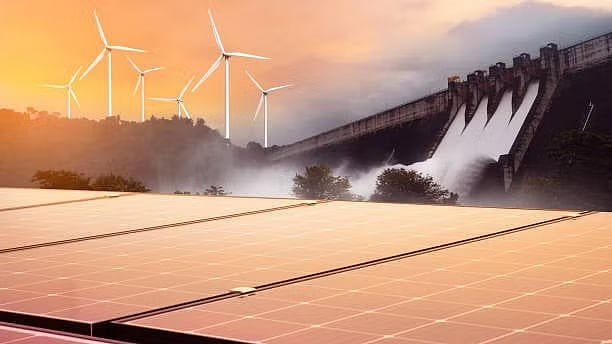
Representational illustration showing renewable energy sources.
Credit : iStock Photo
New Delhi: An increase in demand for land will pose a challenge to India’s transition to a green economy as most of the renewable options are “land-intensive”, says the Economic Survey 2023-24, noting that the country’s per capita availability of land is the lowest among the G20 nations.
On the challenges for the renewable sector, the Survey prepared by the Union Finance Ministry has identified that the availability of land and absence of recycling for discarded solar panels are the two big bottlenecks.
“The availability of land is a major challenge for India, which has the lowest land availability per capita amongst the G20 countries. The transition cost would be amplified with the expected increase in the need for land for renewable energy projects,” it says.
Since expansion of renewable energy and clean fuels will increase demand for land and water, the future scenarios of an increase in energy demand to meet the higher standard of living need to be analysed in the context of rapidly depleting land and water resources.
Quoting a report prepared by the Office of the Principal Scientific Advisor, the Survey says one MW of solar photovoltaic may require around 1–1.5 hectares of land and 60 GW of solar power will need about 600 – 900 sq km of land area at an all-India level.
The site location for new solar PV plants may require land acquisition in semi-habituated areas for shorter grid evacuation infrastructure, which can pose a challenge, it notes.
India’s per capita availability of land is only 0.002 sq km, which is 3.5 times less than that of China and 14 times less than the USA among the G-20 nations.
On the critical challenge of recycling of old photovoltaic cells and solar panels once their life ends after 25-30 years, the Survey says the government needs to come out with a comprehensive policy on managing the PV waste as dumping it in a landfill may lead to leaching of toxic materials to soil.
While the E-waste Management Rules, 2022 seeks to address the issues concerning disposals of PV cells, the challenge will be posed by the volume of such waste that India has a target of 500 GW of installed renewable capacity by 2030. “The challenge imposed by scale cannot be overlooked,” it says.
Union Budget 2024 | Making a record for any Finance Minister, Nirmala Sitharaman will be presenting her 7th Union Budget on July 23, 2024 under the Modi 3.0 government. While inflation has burnt a hole in the pockets of 'aam janata', will this Budget spell relief for Indians? Track the latest coverage, live news, in-depth opinions, and analysis only on Deccan Herald. Also follow us on WhatsApp, LinkedIn, X, Facebook, YouTube, and Instagram.
